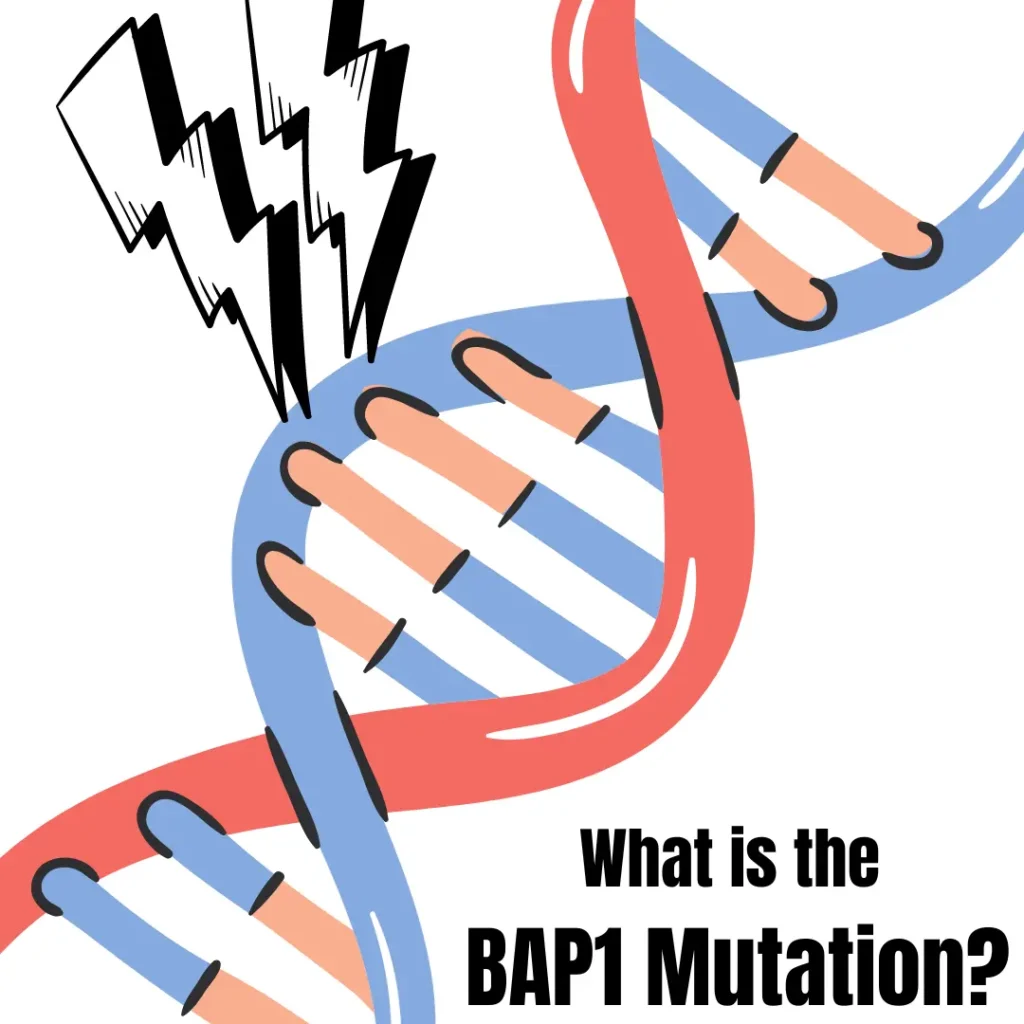Key takeaways: The BAP1 gene encodes for a variety of regulatory proteins and processes, and
is considered an antitumor gene. Mesothelioma onset is associated with a BAP1 mutation, either
inherited (called a germline mutation) or caused by ingested asbestos. A BAP1 mutation allows
mesothelioma cells to proliferate and spread, virtually unchecked. Although there isn’t a way to
reverse a mutation, there are existing treatments that imitate the functions of proteins and
enzymes associated with a working BAP1 gene.

What is the BAP1 Gene?
Although mesothelioma is causally related to asbestos exposure, asbestos exposure often incites
local inflammation and genetic mutations. In approximately 60-70% of all mesothelioma cases,
the BAP1 gene is mutated (and although this mutation can be inherited, it can also be mutated
via epigenetics and external factors, like ingested asbestos). In healthy individuals, the BAP1
gene is responsible for coding proteins that control tumor growth–these proteins inhibit
extensive cellular growth, regulate programmed cell death, and control normal DNA repair,
among other regulatory functions.
When the BAP1 gene suffers a mutation, then all of the functions that fall under its “watch” are
hijacked. By effect, a BAP1 mutation serves mesothelioma: cellular proliferation and death are
no longer regulated, so cancerous cells aren’t bound by the body’s natural safeguards.
Can you Tell if you Have a BAP1 mutation?
Although there aren’t signs or symptoms of a BAP1 mutation, you can receive genetic screening
to test for BAP1, especially if several family members have received a mesothelioma diagnosis.
If the mutation is present, your medical record will reflect that. Because BAP1 mutations are
associated with cancers beyond mesothelioma, you will likely receive yearly screenings for these
cancers (which include melanomas and carcinomas). Some researchers suggest a yearly X-Ray,
ultrasound, and MRI for asymptomatic patients (with the BAP1 mutation) as young as 30.
If you begin presenting with symptoms that align with mesothelioma, you’re more likely to
receive a faster diagnosis considering your medical record indicates a heightened risk of onset. In
addition, if you’ve suffered a known exposure to asbestos and have a mutated BAP1 gene, you’re
more likely to be tested for mesothelioma before other more common diseases.
Can a BAP1 Mutation be Reversed?
A BAP1 mutation cannot be reversed, but there are treatments and clinical trials that mitigate the
effects of the mutation. Because the effects of the BAP1 mutation are multifaceted in nature–as
the gene contributes to several distinct cellular processes–an approach that is also multifaceted is
necessary. Some immunotherapeutic options help to build immunity so that extant immunity can
“take over” the antitumor capacities of the BAP1 gene. Other treatment options introduce
enzymes that mimic the functions of BAP1-associated proteins and enzymes. Still other options
involve the blocking of enzymes (called PARP) that repair damaged DNA in cancer cells; if
cancerous DNA cannot be repaired, then the cells cannot reproduce.
Because researchers have established BAP1 and mesothelioma as being causally related, patients
can undergo genetic screening to receive a faster diagnosis; a quick diagnosis is directly linked to
improved patient outcomes and prognosis. Ideally, relatives of mesothelioma patients can receive
genetic counseling to help determine the best course(s) of action if they have a BAP1 mutation.
If you or a loved one has been diagnosed with mesothelioma, please call 1 (800)-505-6000 or fill
out our form. We are here to help you navigate the legal process of filing a claim to receive
compensation for your mesothelioma diagnosis. We help mesothelioma victims and their
families in Pennsylvania.
Sources:
https://www.ncbi.nlm.nih.gov/pmc/articles/PMC7655689/
https://www.ncbi.nlm.nih.gov/pmc/articles/PMC5504107/
https://www.cancer.gov/publications/dictionaries/cancer-terms/def/parp-inhibitor
